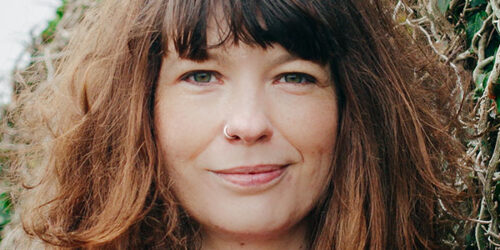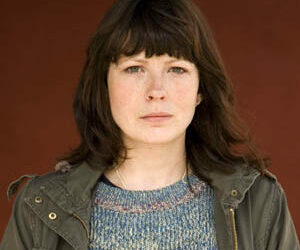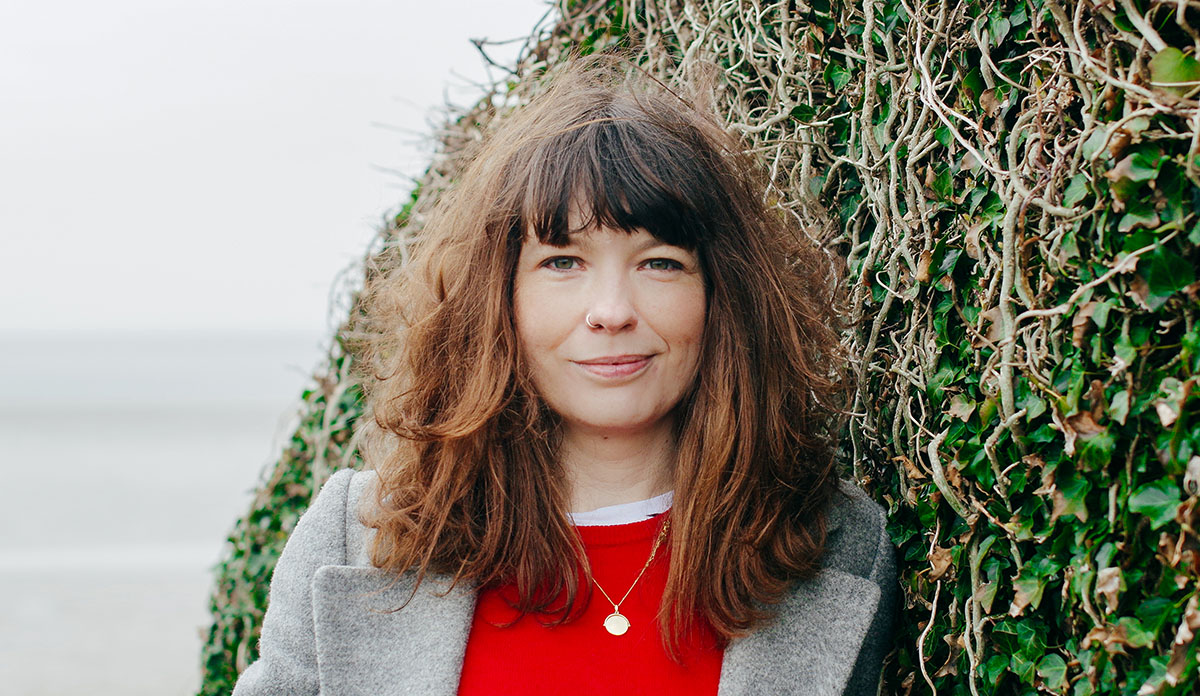
Short stories are not just a good training ground for new writers, they are a rich and rewarding artform in their own right. But, as this article explores, short stories are both more and less than simply tiny novels. Short fiction is a discrete form with its own characteristics. As such it demands different methods, skills and considerations.
This article will help you write compelling short stories with intriguing ideas, interesting characters, tight dialogue and satisfying endings. It also covers structure, pace and editing. This article is based on our conversation with novelist, short story writer, university lecturer and NCW Academy tutor Jenn Ashworth, which featured on the Writing Life Podcast in October 2022.
Jenn tutors our online intermediate memoir writing course. Apply for her course, starting Monday 12 February →
In the episode, we also reference her short story Midsummer Eve. You can buy the whole collection from Black Shuck Books in paperback (£12) or ebook (£2).
The short story vs the novel
When I started writing, I started by writing a novel. I was advised to start with short stories, but I didn’t find it remotely useful because I’ve always found short fiction to be the most difficult form.
A novel gives you room for a certain amount of bagginess and there is pleasure in that. There’s pleasure in redundancy, slowness, in repetition. Good novels can hold all of that.
Short stories are like an intricate watch: every element has to count and must relate to everything else in a very deliberate way.
As such, my relationship to each form is different. The reason I love short stories as a reader is very different from the reason I love novels.
With a novel, you can get inside that world and live there and engage with the characters in different ways. You can read a bit on Monday, but when you pick it up again on Friday you’ve changed your mind about things. You’re in a different mood and a novel is with you through all of that.
A short story is a completely different experience for me. It’s a distilled hit. Like a shot of something. The intensity relies on brevity and concision. Everything on the page has to be precise and deliberate because everything relates to everything else.
Ideas
When I have an idea, I know whether it’s a short story idea or novel idea. I don’t have that many novel ideas – maybe one every four or five years.
When I write a short story, all the imaginative work that is required for a novel is also required for a short story. You have to know the entire world and all the characters’ backstories and what they would say if they were given the microphone, just as you would with a novel. The difference is that, with a short story, you choose which bits of that you’re going to relay to the reader – and that’s a lot harder to do.
 Introducing Midsummer Eve
Introducing Midsummer Eve
My short story Midsummer Eve is based on a couple who are on a luxury all-inclusive vacation. They’re in a hotel, they get their drinks and all their food, but we begin to realise immediately that Terry is an awful human being and that there is something not quite right going on at the resort.
Those were the two things I wanted to play with. I wanted every page to coax the reader into having theories about the story:
- What’s going on with Terry?
- What’s going on with the hotel?
I wanted the reader’s theory to evolve or change in some way with every page.
It didn’t take me as long to write as a novel, but it took just as much work.
Back story and exposition
Short stories don’t need tons of exposition. With long-form, the reader requires backstory and exposition. They require some sort of greater logic for the machine.
In short stories, no one expects that and so I don’t do it. If I say, ‘this is how the world works’ in the short story, the reader accepts that. It’s a risk because they might not, but you can be bolder. I love that in short fiction.
The relationship with the reader is very different between the two forms.
In Midsummer Eve, the couple are in a beautiful resort on an unnamed tropical island. There is a sense that they’ve come from the UK. There’s a sense of what their lives might have been like and there’s a sense that something else is happening in the world.
If this were a novel, I would have had the chance to dramatize a lot of that. However, as this is a short story, those elements are hinted at with only two or three short lines.
This is how you work with genre. I trusted that the reader had some knowledge of the kind of images that we all lived with on the news through the pandemic, as well zombie films, 28 Days Later and the apocalypse genre. I only needed to include hints and the reader would do the rest. Many of my short stories have a horror, gothic or supernatural feel – there’s an uncanniness.
That’s one of the things I love about short fiction: the amount of work that the author requires of the reader – it becomes a partnership between reader and writer.
For example, I’m writing a story about a couple who are dealing with infidelity. The couples’ therapist suggests they get a hobby, so they choose dowsing for dead bodies. In a novel, I would have to do five chapters of character work before the reader believes that this couple would decide to do this. With a short story, your reader is already onboard for a bold, risky, not quite realist or naturalist character, so I can just say ‘trust me, let’s have some fun’. I love that about short stories.
With novels, all that stuff I don’t do in short stories, I love doing. I love the slow unraveling of backstory. I love that we don’t only see one character taking an action in a scene, or in relation to someone immediately close by them. Everything is about everything else. If a couple are having an argument, it’s also about them, it’s about their parents, their parents’ parents, where they live, even how they were educated. A novel allows you to concentrate on the precision of the scene, but also gives us that broader context.
This is particularly relevant to the fiction I write; I’m not making rules about what these forms should do, because even as I say this, I can think of some very precise spare bold radical illogical novels and very contextualised short stories, so there are exceptions.
World-building in short stories
Short story writers don’t get away with not doing world-building. It’s still got to be in your head. Then you’ve got to pick which bits of it you’re going to give to the reader. That’s why it’s a more difficult form.
I love world-building. I love fantastical genres, the expanse and bagginess of a novel, so it’s not like the genre Olympics, but they’re definitely very different things.
Short stories aren’t little novels or bits of novels. There is much more in their relationship with time and space and death, like poems and drama – especially radio drama. I learn more about short stories from those latter forms than I do from novels.
What do the public think of short stories? They seem to be less popular than novels as a form. This seems strange, considering how much they offer, with less time invested.
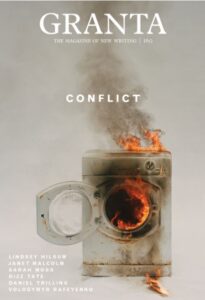
It’s tricky. The publishing industry would always prefer a writer to deliver a novel than a series of short stories. That’s economic. Possibly a novel is easier to market, to sell. And there are more review spaces for novels, more competitions and awards for novels, so it’s the big beast of fiction publishing. We do have a really thriving, exciting small press – periodicals – for short stories. The economics are against short stories, and I don’t know why that is, given that a short story is the perfect thing to read on your mobile phone when you’re waiting for the kids to come out from school. In that 10-minute gap, people aren’t going to short stories, they’re going to a podcast or social media. I don’t have a solution, but I think that’s what happening.
Those people who do buy and write for Granta, Black Static, The Night Jars, they are passionate about it. It matters. It’s not a lesser form, it’s the real thing. I know writers love them.
People may not be reading short stories like they did, or like we’d like, but people – including me – love listening to short stories. A couple of short stories is the ideal thing to listen to while I’m walking the dog. The BBC contributes a lot with shows on Radio 4 and 3 – have a look in the BBC Sounds app/site. There are lots of podcasts with dramatized short stories as well – the hinterland between audiobook and play.
So, there’s hope.
Some short story podcasts
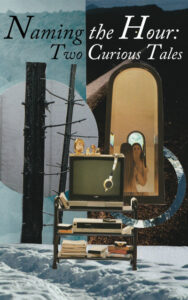
Maybe we writers shouldn’t rely on our industry to make those spaces for us, maybe we should get punk and DIY about it and get our short stories out there ourselves. That’s what I tried to do with Curious Tales, a self-publishing project I worked on with a few friends – writers and artists. It was a tiny boutique self-published collection of ghost stories. They didn’t even have ISBN numbers. We sold them at events. We didn’t make any money, but the project washed its face and drew some attention to it. Even The Telegraph covered it. It shows that we don’t need to rely on the industry, writers can take matters into our own hands.
Are some ideas too large to be short stories? Are some ideas too small to become novels?
There will be writers who can condense multiple generations of activity into 2,000-3,000 words. That’s not me.
For example, my new story about the couple who decide to go dowsing for dead bodies. I knew that that was a short story, because I didn’t care about the circumstances of the affair or whether the marriage survived, or their kids or jobs. I will imagine all that material as I work on the story, but what I really cared about was, are they going to find a body or not?
A short story idea is very distilled and focused.
I had a very distinct and focused question about what kind of horror their marriage needed to survive and what that might say about that type of relationship. It was a really small question, and it was the only one I was most interested in.
If this were a novel idea, I’d have been super interested in the other woman or man and who found out and how that worked and what their parents had to say about it and what they all did for a living.
For me, a novel is about cause and effect. It’s about backstory: how did we get here? What kind of person does this?
A short story idea is very distilled and focused.
There’s almost something naughty and playful about short stories. When I tell people the idea they laugh. And that’s how I felt when I thought of it. There’s something different about the compositional mood, even if the short story doesn’t turn out to be playful or cheeky. There’s something about that mood that’s quite antic and that’s different from novels which are much slower, more deliberate.

Kirsty Logan on short stories
A novel is like entering a garden. You walk into the garden, and you hang out in the garden and see everything and walk around. But a short story is like looking through the keyhole. That idea really helped me understand that I still need to imagine the whole garden. My job is to construct the keyhole, the angle and how much they would see.
How NOT to develop characters in short stories
Developing characters and character arcs in short stories is hard and many short story writers get themselves in trouble by trying to use the epiphany to deliver character development.
I’m quite suspicious of them in real life because I don’t think that’s how human nature works. I don’t think that we look out of the window, see things in a certain light and decide we’re not going to be a philanderer anymore. People change, but that’s not how they change. I’m also quite suspicious of how epiphanies are used in short stories, to usher in an ending or give some kind of unearned fanfare or gravity at the end.
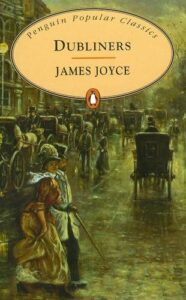 I quite like the way Joyce uses epiphany. My favourite story from Dubliners is Evelyn, which is all about change. She’s living with her family; she’s going to go on a boat to Argentina. She’s had this restricted miserable life so she’s leaving, and everything is going to be fantastic. There is an ironic epiphany: she hears the horn of the boat and she realises that she’s going nowhere, that she is going to stay and the boat is going to go. There’s something there that I think is very truthful about character change and character development that would not have worked in a novel. We couldn’t have gone 300 pages with Evelyn only to have her not get on the boat. Within 10 or 12 pages, we can.
I quite like the way Joyce uses epiphany. My favourite story from Dubliners is Evelyn, which is all about change. She’s living with her family; she’s going to go on a boat to Argentina. She’s had this restricted miserable life so she’s leaving, and everything is going to be fantastic. There is an ironic epiphany: she hears the horn of the boat and she realises that she’s going nowhere, that she is going to stay and the boat is going to go. There’s something there that I think is very truthful about character change and character development that would not have worked in a novel. We couldn’t have gone 300 pages with Evelyn only to have her not get on the boat. Within 10 or 12 pages, we can.
Creative writing teacher David Jauss wrote a book called Alone With All That Can Happen: Rethinking Conventional Wisdom About the Craft of Fiction (in the UK it’s called, On Fiction). As a teacher like me, he reads hundreds of short stories. He says they so often use epiphanies, and so often leave him none the wiser. But it’s hard for short story writers because you feel that you have to deploy some wit or wisdom about life to your reader.
This really underestimates the reader: the reader knows as much about being alive and being a human as you do.

Jauss talks about the predictability of the epiphany as a way of ‘doing’ character change and development. He says, the epiphany arrives at the end of the story, exactly on time, like trains in a fascist state.
As a reader, I love epiphany, surprise, twists or a joke, but I don’t want to use those techniques as a writer in order to deliver a theme or a moral or an idea.
Short story does have a relationship to the fable and the parable – they’re teaching forms – but I don’t want to use my short stories to do that. I want to give my reader a really effective emotional experience. What they do with that – the meaning they take away – is entirely up to them.
How to develop characters in short stories
Character development in short stories isn’t always about change, but about understanding – the character’s, the reader’s or both.
A character may not even have more understanding of their situation by the end. Or they may have a faulty understanding and miss that truth, but the reader now gets it. The reader sees something differently. This feels like a more modest aim for a short story. It’s also more nuanced and subtle.
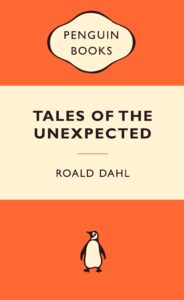 I love stories that surprise me, and I love stories that make me laugh. Roald Dahl’s Tales of the Unexpected – short stories for adults – are brilliant, but if you read five of them in a row, you begin to expect the thing that you’re not supposed to expect, so ‘surprise’ is quite a tricky thing.
I love stories that surprise me, and I love stories that make me laugh. Roald Dahl’s Tales of the Unexpected – short stories for adults – are brilliant, but if you read five of them in a row, you begin to expect the thing that you’re not supposed to expect, so ‘surprise’ is quite a tricky thing.
In Midsummer Eve, Terry’s understanding of his situation changes. He realises what’s going on, but he does it just after the reader does. This means we get to see him realise it, just after we have.
The reader knows from the beginning of Midsummer Eve, that Terry is a terrible person: he doesn’t understand his own privilege, he’s blind to the way he’s safe and comfortable, and other people aren’t, that’s not news to anyone. The horror of that story is the way that other things become news to Terry. And I want the reader to really feel that, then figure out what that means in their own time.
How to plan a short story
The ‘what?’
I know that I need to get the sweet spot right before I start: what I know and what I don’t know. I don’t seem to be able to start a short story unless I know something big and interesting about the ‘what?’. It might not be the ‘what happens’, but there’s something about the subject matter that I’ve got a question about, and so I want to explore.
For example, in my dowsing story: I’ve done some research about dowsing. I spent yesterday in bed watching videos on YouTube and reading the website of the British Dowsing Society. I need to know a bit about the ‘what?’ – not everything. I have to have a question that excites me.
I’m really interested in what happens if they’re successful or unsuccessful in finding a dead body. I don’t know whether they do yet and I’m excited to find out as I write it. I hope the reader feels that excitement as they read it, wanting the same questions to be answered.
The ‘how?’
Then I need to know the ‘how’: how I’m going to tell this story. I don’t need to know everything about the ‘how’, but I do need to know if it’s going to be first person or third person, what tense, and something to do with the tone.
Very often there’s a clear relationship between the what and the how. My new story is about a marriage. I know that the ‘how’ is going to be a slippery first-person plural – in the ‘we’ voice.
How to manage pace with short stories
I love short stories that just ramp up and ramp up. I love the intensity. I love genres – whether long or short form – that use suspense as a narrative motor, which withholds something from the reader and tells the reader that something is being withheld. I’m going to give it to you at the end. There’s a very particular kind of relationship and it is seductive and addictive and I love to be on the receiving end of that.
I love short stories that just ramp up and ramp up.
There are other options. Short stories have a relationship to the essay as well as to the poem and the radio drama. The essay thinks, it meditates. It might stay on the spot and look around; it might go round in circles. We’ve got that upward trajectory towards a climax – whether that’s an epiphany, a twist or a reveal. And if it’s done well, we love it and it’s great. It’s like a shot in the arm.
We’ve also got models to do with the meandering of thought. And that perform thought and the muddle of that. I enjoy those as well.
That’s what I love about anthologies. They’re like a buffet of emotional effect and genre and mood. I’d rather have an anthology of short stories by different writers than by one person – I think you get that breadth and range.
Writing and editing short stories
I have enough to start, but not enough to finish it so I need to write into it.
I will probably write about twice as much as I need. I let myself ramble, dither, write repetitively, use as many cliches as I like. The actual writing takes place in the second, third and fourth drafts where I make everything as short and clean as possible. That process is pretty stable for my short fiction.
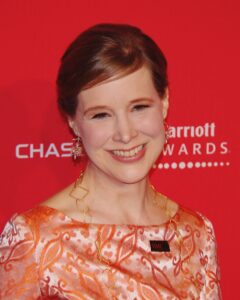
I figure out enough about the ‘what’ and the ‘how’ to start, and then I dive in and make a complete mess. Ann Patchett says that the most important thing is to forgive the first draft for being what it is. A lot of the students I work with fall foul of the process. They compare their first drafts to finished drafts of the short stories they love, and they don’t realise that there are six months of crying and deleting and editing between those two.
Some people may find it hard to start a project not knowing where the destination is, but the purpose of those first drafts is to find out where the destination is and, over time, how to get there, and how to get there efficiently and beautifully.
Some of it is about holding your nerve. Some of it is about having faith in the process. I have much more faith in the process because I’ve written lots of short stories and some novels. I’ve learned to hold my nerve and let early drafts be awful, repeatedly for three years. Writing novels has been good training. Now, I can work on a short story in that way.
There are some things that are a little easier when writing short stories – not least because you can see the whole thing at once. I can write that first draft, 9,000 words, aiming for 4,000, and I can still read it in one go. I can still get a sense of pace and shape. It’s much more difficult with a novel to step back from the canvas and see the whole thing at once.
What to cut
I try and cut backstory. With Midsummer Eve, I cut early scenes of the couple in the airport, buying their tickets to go on holiday and the first few days in the hotel when it was busier. Everything I cut, I thought, ‘what is the most important thing I want to show, and can I do that in three words?’
It’s good for the ego. You’ve got to have faith that typing is cheap. There are plenty more words where that came from. I can type that again if I need to. Let’s just cut it. The advice I would give to other writers is: if your ego doesn’t let you do it, you don’t need to delete it. You can save it somewhere else and keep it in another file: anything you need to do to trick yourself into cutting things.
I look at dialogue. Often mine is too long because I write the way people really talk, with a lot of blathering, beating around the bush and small talk. I’m writing my way into a knowledge of the characters. Once I know the characters, I can cut a lot of that. I can imply that a longer conversation has been had, but I’m only going to show the reader the most important lines.
A first draft is the workshopping of the character.
Often, I have to lop off the first three pages and the last couple of pages. I’ve heard the first few pages of a short story draft described as clearing your throat before you make a speech: no one needs the throat-clearing, just start.
I often chop the end quite a lot. Writers are often worried that the reader didn’t get it, so they explain it again in different ways. Often that’s ego or a lack of trust in the reader, ‘did you get it? Did you really get it? Did you like it?’ Get rid of all that.
Once I’ve done that, I show it to another writer who may pick up on repetitions or description that I miss. That’s the great thing about short story: if you’ve got a location and you’ve described it once, even if the characters go back there, you don’t need to describe it again because the reader was there two minutes ago.
A first draft is the workshopping of the character. Through doing it you find out their idiosyncrasies. The bit at the beginning that I cut from Midsummer Eve is where Terry’s making a speech about Brexit. Not being able to get the service he expected and where were the people who were supposed to be making his life easier? He couldn’t figure it out. I cut so much of that, because I could communicate who he was by showing his attitude towards the kinds of people that do that domestic work in hospitality. The reader knows full well which way Terry voted in the referendum.
 Jenn’s latest novel, Ghosted: A Love Story, is available now.
Jenn’s latest novel, Ghosted: A Love Story, is available now.
“Ghosted is a marvelous novel; thrumming with the absences and presences that can haunt a life, and shot through with flashes of great sadness and joy. If you don’t know Jenn Ashworth’s work already – which you should – this is a great place to start.” – Jon McGregor
You may also like...
PODCAST: What makes a great short story? With Jenn Ashworth
Writer and teacher Jenn Ashworth explains how theme, character, dialogue, editing and structure vary between novels and short stories.

10th October 2022
Jenn Ashworth on writing fiction & non-fiction
Talking to Flo Reynolds on the podcast

8th October 2021
Writing a short story – where do you start?
Writer, editor and creative writing tutor Lynne Bryan offers her advice for embarking on your first journey into the short story form

9th January 2020



